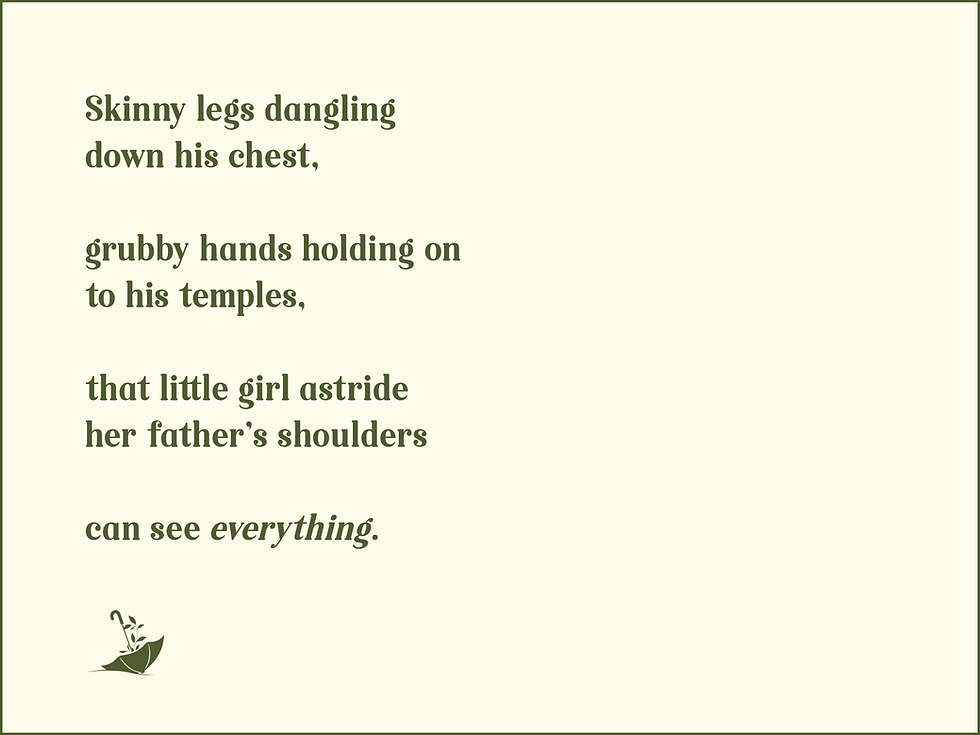Q&A with Elisabeth Murawski, writer of 'Little Polish Girl'
- Wild Umbrella Staff
- Mar 7, 2024
- 3 min read
Updated: May 9, 2024
Our poetry section kicks off this month with "Little Polish Girl", a new poem from American poet Elisabeth Murawski. Elisabeth is a well-published poet, having won the Robert Phillips Poetry Chapbook Prize and the May Swenson Poetry Award for her collection entitled Zorba's Daughter.
She's a native of Chicago, Illinois, and our Editor-in-Chief Julian Kanagy (a Chicago-based poet himself) had the pleasure of asking her a few questions about her poem and her writing:
Julian Kanagy: In "Little Polish Girl," the titular narrator's explorative contemplation of blame, privilege, and guilt begins with reading a book through her own life's lens. As a poet, do you often find inspiration for your work in reading or artwork (and if so, do any individuals in particular stand out to you)?
Elisabeth Murawski: I find inspiration just about anywhere, sometimes a photograph, sometimes a work of art, sometimes in reaction to something I've read, especially if I disagree with it. I've been fascinated by the sculptor Camille Claudel, have written several poems about her Also Marina Tsvetaeva, the poets Edward Thomas and Alun Lewis.
JK: What inspired you to write this poem? Is it part of a broader project that you're working on, or has it always stood alone?
EM: It's not part of a conscious project, but I've written about my childhood beliefs before because they were so important to me.
JK: "On us / and our children!" alludes to the gospel of Matthew, in which those demanding Jesus's crucifixion declare that the blood shall be on their hands and that of their children. Our titular narrator is glad to be absolved of that guilt, and finds power in assigning it elsewhere. When you began writing this piece, did you know that you would use that verse?
EM: As a child reading those Bible stories I was moved by the suffering Jesus, unfairly accused. I'd heard "on us and our children" in church on Good Friday. It's hard to write about the crucifixion without that phrase coming up, suggesting itself. I wanted/needed to blame someone, the Other, the not-me.
JK: Literary, religious, and cultural allusions tend to combine powerfully with imagery of childhood, innocence, and nostalgia, and your piece is no exception; where does the image of this Little Polish Girl reading this scene come from, for you? I also wonder if - as an adult and as a poet - you find yourself with new and compelling perspectives on the power of those images, and if this piece is one such example? When you share a poem like "Little Polish Girl" with the world, do you have any expectations for how readers will feel when they hear or read your words?
EM: I suppose I hope the reader will get what I'm trying to say. And that the little Polish girl was encouraged to see the Jews as culpable; Poles are notorious for their anti-Semitism. I was raised with it, had to overcome it. Exquisite irony: I learned five years ago from DNA testing that I am half-Jewish.

Julian Kanagy
Julian Kanagy is a Chicago-based poet and editor. His poetry samples a Midwestern upbringing peppered with loss and abandonment, thrives both in the confines of formal structure and the simplicity of its absence, and expands into an ongoing search for the beauty in everyday life when it seems to be hiding. He started Heirlock Magazine to amplify underrepresented voices and The Wild Umbrella to celebrate writing for writing's sake; both as an editor and in his own work, Julian follows the advice of a mentor: “find the poems that nobody else could have written.”

Elisabeth Murawski
Elisabeth Murawski is the author of Heiress, Zorba’s Daughter (May Swenson
Poetry Award), Moon and Mercury, and three chapbooks. Still Life with Timex won the Robert Phillips Poetry Chapbook Prize. A native of Chicago, she currently lives in Alexandria, VA.

Comments